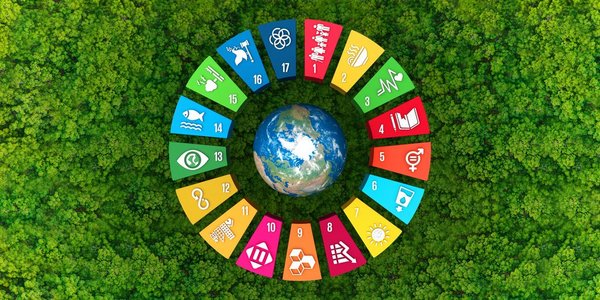 Read this article in French
Read this article in French- Share this article
- Subscribe to our newsletter
More effort is needed to achieve the SDGs
Today, we are on the verge of a critical juncture, the authors of the latest edition of the annual Sustainable Development Goals (SDGs) progress report state. Either we fail to deliver on our commitments to assist the world's most vulnerable, or we step up our efforts to rescue the SDGs and deliver meaningful progress for people and planet by 2030.
The report, launched in July 2022, was prepared by the United Nations Department of Economic and Social Affair (UN DESA), in collaboration with the entire UN Statistical System consisting of more than 50 international and regional agencies. The climate crisis, the COVID-19 pandemic and an increased number of conflicts around the world have placed the 17 SDGs in jeopardy. The combined crises could lead to an additional 75 million to 95 million people living in extreme poverty in 2022, compared with pre-pandemic projections.
Funding data and information infrastructure must be a priority
“The road map laid out in the Sustainable Development Goals is clear,” stated Liu Zhenmin, United Nations Under-Secretary-General for Economic and Social Affairs. “Just as the impact of crises is compounded when they are linked, so are solutions. When we take action to strengthen social protection systems, improve public services and invest in clean energy, for example, we address the root causes of increasing inequality, environmental degradation and climate change.”
The report also emphasises that to emerge stronger from the crisis and prepare for unknown challenges ahead, funding our data and information infrastructure must be a priority for national governments and the international community.
Multiple crises jeopardising the SDGs
The COVID-19 pandemic has wreaked havoc across the Goals, and its effects are still far from over. Global “excess deaths” directly and indirectly attributable to COVID-19 reached 15 million by the end of 2021. More than four years of progress in alleviating poverty have been wiped out, pushing 93 million more people world-wide into extreme poverty in 2020. An estimated 147 million children also missed more than half of their in-person instruction over the past two years. Furthermore, the pandemic severely disrupted essential health services, derailing hard-won progress on SDG 3.
Meanwhile, the world is on the verge of a climate catastrophe where billions of people are already feeling the consequences. Energy-related CO2 emissions for 2021 rose by six per cent, reaching their highest level ever and completely wiping out pandemic-related declines. To avoid the worst effects of climate change, as set out in the Paris Agreement, global greenhouse gas emissions will need to peak before 2025 and then decline by 43 per cent by 2030, falling to net zero by 2050. Instead, under current voluntary national commitments to climate action, greenhouse gas emissions will rise by nearly 14 per cent over the next decade.
The war in Ukraine is creating one of the largest refugee crises of modern times. As of May 2022, over 100 million people have been forcibly displaced from their homes. The crisis has caused food, fuel and fertiliser prices to skyrocket, further disrupted supply chains and global trade, roiled financial markets, and threatened global food security and aid flows. Projected global economic growth for 2022 was cut by 0.9 percentage points because of the war in Ukraine and potential new waves of the pandemic.
The world’s most vulnerable countries and population groups are disproportionately impacted. Women have suffered a greater share of job losses combined with increased care work at home. Some evidence suggests that violence against women has been exacerbated by the pandemic. Young people continue to have higher unemployment rates than before the pandemic, and child labour and child marriage are on the rise. Least developed countries struggle with weak economic growth, rising inflation, major supply-chain disruptions, policy uncertainties and unsustainable debt.
(UN DESA/ile)
Read more at UN DESA website





Add a comment
Be the First to Comment